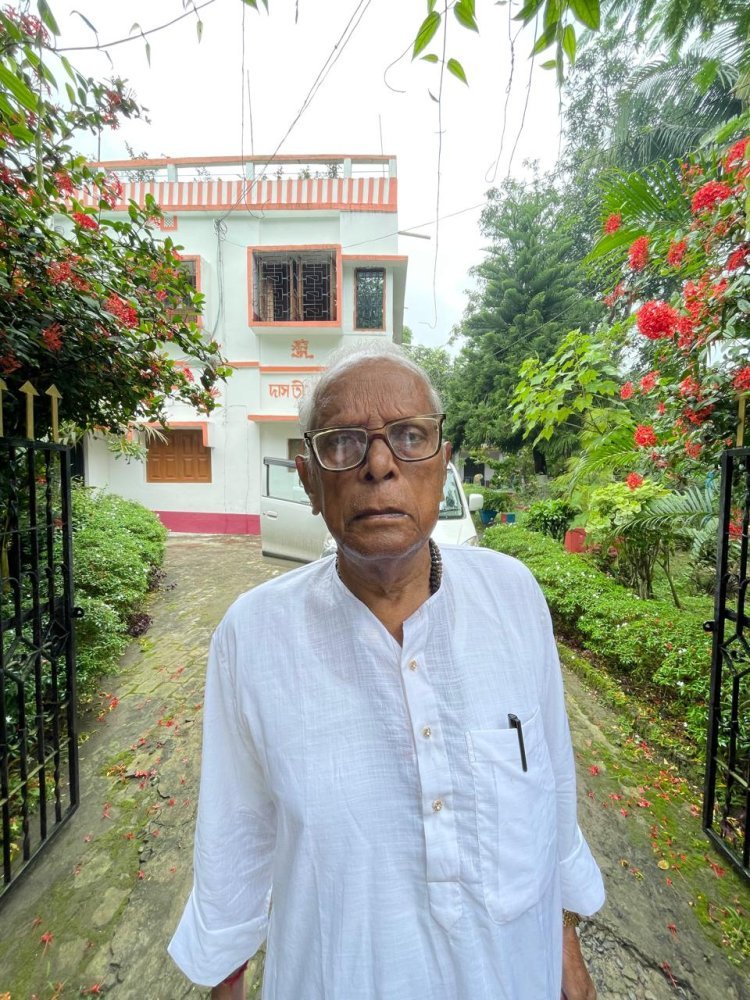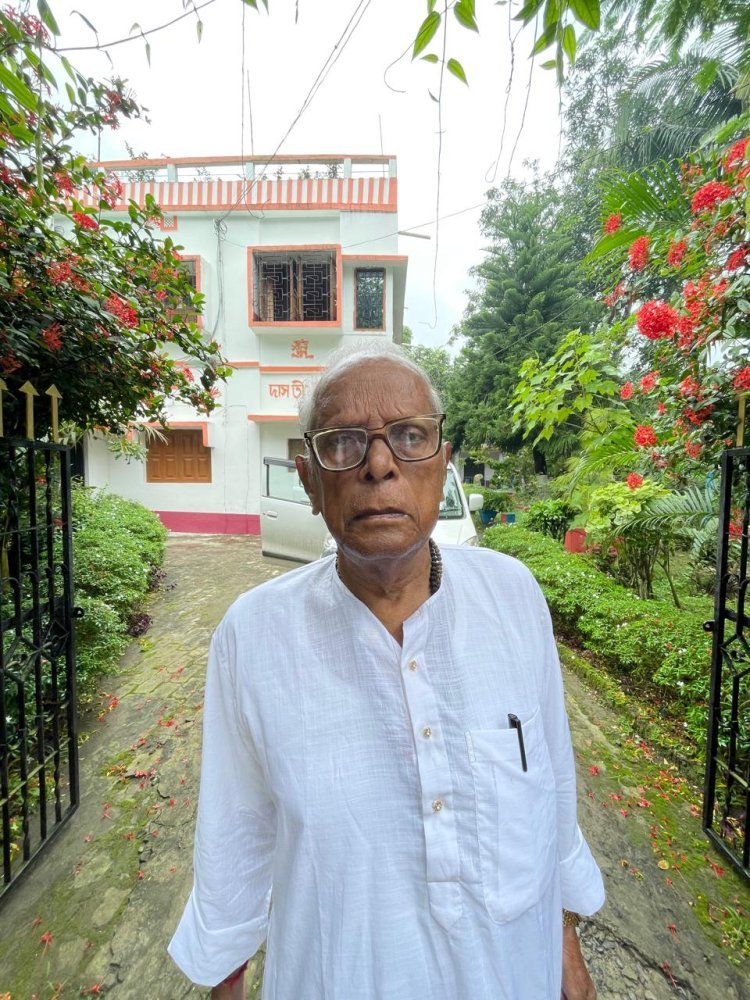Dr. Anil Chandra Das: A Luminary in Vedanta Darshan, Sanskrit, and Bengali Literature

Dr. Anil Chandra Das is a name that resonates with reverence and admiration in the intellectual and spiritual circles of Dakshin Dinajpur and beyond. His multifaceted contributions as an educator, writer, speaker, and researcher have left an indelible mark on Vedanta Darshan, Hindu philosophy, Sanskrit, and Bengali literature. With a career spanning several decades, Dr. Das has imparted knowledge to thousands of students and enriched the academic and spiritual discourse through his extensive work. This biography seeks to encapsulate this distinguished scholar's life, achievements, and ongoing legacy.
Early Life and Education
Dr. Anil Chandra Das was born into a family rooted in traditional Hindu values and education. After the partition of India in 1957, he came alone to India and started struggling to build his career. From a young age, he displayed an insatiable curiosity for knowledge, particularly in Sanskrit, Bengali literature, and Hindu philosophy. His early education laid the foundation for a lifelong pursuit of academic excellence and spiritual enlightenment. Dr. Das pursued his higher education with unwavering dedication. He completed his Master of Arts (M.A.) in Bengali and Sanskrit, two disciplines forming the bedrock of his scholarly endeavors. Recognizing the importance of pedagogy, he also earned a Bachelor of Education (B.Ed.) degree, which equipped him with the skills to impart knowledge effectively.
His academic journey did not stop there; he achieved a Ph.D. in Literature, cementing his status as a scholar of the highest caliber. In addition to his formal education, Dr. Das undertook rigorous training in traditional Hindu scriptures and philosophies. He earned titles such as "Kavya Vyakaran Tirtha" and "Puran Madhya," reflecting his deep understanding of Sanskrit grammar and ancient Indian scriptures. His proficiency in Hindi, as demonstrated by his "Hindi Parichay" certification, further broadened his linguistic and literary capabilities.
Teaching Career
Dr. Anil Chandra Das's career as an educator began in the modest setting of Jhapurshi FP School, where he served as an assistant teacher. His passion for teaching and his profound knowledge quickly garnered the attention of both students and colleagues. His dedication to nurturing young minds and innovative teaching methods soon led to his appointment as an Assistant Teacher at Bolla RK High School, a significant step forward in his career. Dr. Das's contributions went beyond the classroom at Bolla RK High School. His leadership qualities and commitment to educational excellence were recognized, and he was promoted to Assistant Headmaster. In this role, he played a pivotal part in shaping the school's academicprograms and fostering a culture of intellectual curiosity among students.

His tenure as Teacher in Charge further solidified his reputation as an exceptional educator and leader. Dr. Das's expertise and reputation as a scholar extended beyond the confines of the high school. He was invited to serve as a Guest Lecturer at Balurghat Girls' College, where he shared his knowledge with a wider audience. His lectures, known for their depth and clarity, drew students from various disciplines who were eager to learn from a master of Sanskrit and Bengali literature.
Contribution to Sanskrit Education: Pranakrishna Chatushpathi
One of Dr. Das's most significant contributions to the field of education was the establishment of Pranakrishna Chatushpathi, a Sanskrit school that aimed to preserve and propagate the ancient wisdom of Hindu scriptures. As the founder and principal teacher of this institution, Dr. Das created a space where students could immerse themselves in the study of Sanskrit grammar, poetry, literature, Puranas, and Vedanta. Pranakrishna Chatushpathi was more than just a school; it was a center of spiritual and intellectual growth. The school, approved by the Bengal Sanskrit Council, offered degrees at the basic, intermediate, and advanced levels, providing a comprehensive education in Sanskrit. Under Dr. Das's guidance, the institution produced 30 to 40 graduates each year, many of whom went on to become scholars, teachers, and practitioners of Hindu philosophy. However, in 2002, the West Bengal government discontinued its approval of the Sanskrit school, a decision that marked the end of an era for Pranakrishna Chatushpathi. Despite this setback, Dr. Das's commitment to education remained unwavering.
Free Education Initiative
In 2003, Dr. Das initiated a noble endeavor to provide free education in Bengali and Sanskrit to students pursuing undergraduate and postgraduate degrees. This initiative was particularly aimed at underprivileged students who lacked access to quality education. Each year, 30 to 40 students benefited from this program, many of whom have since established themselves in various fields both in India and abroad. Dr. Das's expertise in the Vedas, Vedanta, Upanishads, literature, and grammar made him a sought-after teacher. His approach to teaching was not just about imparting knowledge; it was about shaping the character and spiritual foundation of his students. This educational program continued until the onset of the COVID-19 pandemic, which brought an abrupt halt to many such initiatives.
Supporting Underprivileged Students
Dr. Das's commitment to social responsibility was evident in his long-standing tradition of offering free Bengali lessons to underprivileged students. From 1965 to 1999, he dedicated a significant portion of his time to teaching these students, many of whom could not afford formal education. On average, around 50 students benefited from his guidance each year. This selfless service to the community not only empowered these students with education but also instilled in them a sense of dignity and self-worth.
Library Establishment and Management Recognizing the importance of access to knowledge, Dr. Das established a library that housed a vast collection of rare and old books. The library became a treasure trove of texts on the Vedas, Upanishads, Bhagavad Gita, Sanskrit literature, grammar, and all the Puranas. In addition to these ancient scriptures, the library contained around 5,000 books covering Bengali literary history up to modern literature. What made this library unique was the fact that it was managed by the students themselves, fostering a sense of responsibility and ownership. Students were allowed to borrow books, and the library became a hub of intellectual activity, attracting scholars, students, and enthusiasts of literature and philosophy.
Establishment and Management of Saraswati Shishu Mandir and Ekal Vidyalaya
Dr. Das's contributions to education were not limited to his institutions. He played a crucial role in establishing and managing Saraswati Shishu Mandir and Ekal Vidyalaya, two institutions that aimed to provide quality education to children in rural and underprivileged areas. These schools focused on holistic education, blending modern subjects with traditional Indian values and culture. Through his involvement in these institutions, Dr. Das ensured that even the most marginalized sections of society had access to education. His efforts were instrumental in shaping the lives of countless children, many of whom would go on to become responsible citizens and leaders in their own right.
Bhasa Andolan
In 1952, Dr. Das participated in the language movement in then-East Pakistan as a student. He studied Bengali and Sanskrit languages throughout his life. "Bangla Bhakti Gitikavya and Sanskrit Hymn Literature Correlation Sutras: A Survey" was his research topic for his doctoral degree.
As a Speaker at Religious Seminars and Workshops
Dr. Das recited the Geeta Chandi Path in a religious program statewide. He attended as a guest speaker at more or less 1000 religious Dharmasavas. Several Islamic religious organizations also invited him.
Book Publications
Dr. Anil Chandra Das has authored over 30 books on Hindu philosophy, literature, and spirituality. His notable works include the first Bengali translation of the "Shiv Geeta," an exploration of Lord Shiva's teachings, and various other books elucidating the Gayatri Mantra, the concept of Om-Kar, and paths to attaining supreme spiritual goals.
Paper Publications
Dr. Das has published over 60 papers in esteemed journals, covering a wide array of topics from the spiritual significance of Omkar and the Gayatri Mantra to the roles of Shakti worship and the importance of remembering God at the time of death. His scholarly articles delve into the essence of Hindu philosophy, the Vedas, Upanishads, and ancient scriptures, contributing significantly to the academic and spiritual understanding of these subjects.
Ongoing Legacy and Recognition
Dr. Anil Chandra Das's life and work have been recognized and celebrated by various academic and spiritual institutions. His contributions have earned him numerous accolades. His legacy lives on through the many students he continues to mentor, the institutions he has established, and the extensive body of literature he has created.
Dr. Das's unwavering dedication to education, his deep understanding of Hindu philosophy, and his compassionate approach to teaching have left an indelible mark on the world. His life's work continues to inspire new generations of scholars and spiritual seekers, ensuring that the wisdom of Vedanta Darshan, Sanskrit, and Bengali literature is preserved and propagated.
Conclusion
Dr. Anil Chandra Das stands as a beacon of knowledge and spirituality. His life's journey, marked by profound scholarship, selfless service, and unwavering dedication to education, continues to inspire and illuminate the path for many. As an educator, writer, and philosopher, Dr. Das's contributions have not only enriched the academic and spiritual discourse but have also fostered a deeper understanding and appreciation of the rich cultural and intellectual heritage of India.


















